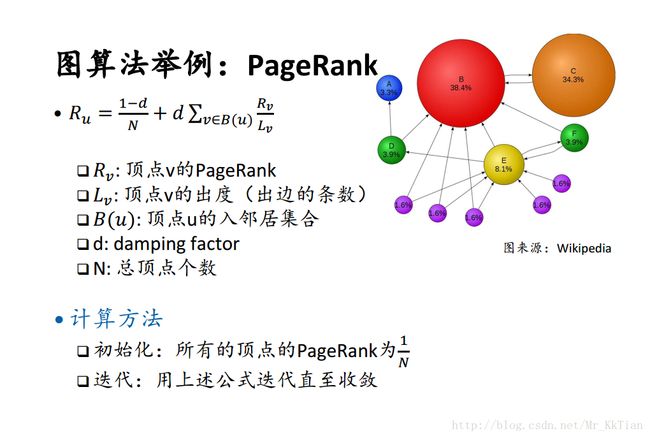同步图运算框架GraphLite实例之PageRank算法
1.PageRank算法介绍
PageRank,网页排名,又称网页级别、Google左侧排名或佩奇排名,是一种由[1] 根据网页之间相互的超链接计算的技术,而作为网页排名的要素之一,以Google公司创办人拉里·佩奇(Larry Page)之姓来命名。Google用它来体现网页的相关性和重要性,在搜索引擎优化操作中是经常被用来评估网页优化的成效因素之一。Google的创始人拉里·佩奇和谢尔盖·布林于1998年在斯坦福大学发明了这项技术。
PageRank通过网络浩瀚的超链接关系来确定一个页面的等级。Google把从A页面到B页面的链接解释为A页面给B页面投票,Google根据投票来源(甚至来源的来源,即链接到A页面的页面)和投票目标的等级来决定新的等级。简单的说,一个高等级的页面可以使其他低等级页面的等级提升。
2.PageRank算法原理
3.GraphLite图运算系统的PageRank算法实现
/**
* @file PageRankVertex.cc
* This file implements the PageRank algorithm using graphlite API.
*/
#include set the type of m_global and m_local value is double
class VERTEX_CLASS_NAME(Aggregator): public Aggregator<double> {
public:
void init() {
m_global = 0; //aggregator global value of AggrValue
m_local = 0; //aggregator local value of AggrValue
}
void* getGlobal() {
return &m_global;
}
void setGlobal(const void* p) {
m_global = * (double *)p;
}
void* getLocal() {
return &m_local;
}
void merge(const void* p) {
m_global += * (double *)p;
printf("excute merge() on PageRankAggregator class, m_global= %lf\n",m_global);
}
void accumulate(const void* p) {
m_local += * (double *)p;
printf("excute accumulate() on PageRankAggregator class, m_local= %lf\n",m_local);
}
};
class VERTEX_CLASS_NAME(): public Vertex <double, double, double> {
public:
void compute(MessageIterator* pmsgs) {
printf("Excute compute(), MessageIterrator *pmsgs, pmsgs.size= %d\n ",pmsgs->m_vector_size);
double val;//PageRank value
if (getSuperstep() == 0) { //Get current superstep number
val= 1.0; //initial all vertex's PageRank=1 u maybe not initial val there,because we initial val at loadGraph()
printf("getSuperstep()==0 val=%lf\n",getValue());
} else {
if (getSuperstep() >= 2) {
double global_val = * (double *)getAggrGlobal(0); //Get global value of aggregator index=0
if (global_val < EPS) { //judge convergence
printf("at compute() on PageRankVertex class, global_val==%lf\n",global_val);
voteToHalt(); return;
}
}
double sum = 0;
for ( ; ! pmsgs->done(); pmsgs->next() ) {
sum += pmsgs->getValue();//getValue() on MessageIterator class return message value.
}
val = 0.15 + 0.85 * sum;
double acc = fabs(getValue() - val);//getValude on Vertex class return vertex value
accumulateAggr(0, &acc);// Accumulate local value of some aggregator. first param is Aggregator index
* mutableValue() = val;
}
//set new PageRank value and then send Message
// * mutableValue() = val;
const int64_t n = getOutEdgeIterator().size();//Get an out-edge iterator.size()
sendMessageToAllNeighbors(val / n);//R_v/L_v R_v=value L_v=n
}
};
class VERTEX_CLASS_NAME(Graph): public Graph {
public:
VERTEX_CLASS_NAME(Aggregator)* aggregator;
public:
// argv[0]: PageRankVertex.so
// argv[1]:
// argv[2]:
void init(int argc, char* argv[]) {
setNumHosts(5); //machine count=5, one master and 4 workers
setHost(0, "localhost", 1411);
setHost(1, "localhost", 1421);
setHost(2, "localhost", 1431);
setHost(3, "localhost", 1441);
setHost(4, "localhost", 1451);
if (argc < 3) { //the number of param
printf ("Usage: %s , argv[0]);
exit(1);
}
m_pin_path = argv[1];//input file path
m_pout_path = argv[2];//output file path
aggregator = new VERTEX_CLASS_NAME(Aggregator)[1]; //define class array PageRankAggregator[1]
regNumAggr(1);//set m_aggregator_cnt=param, aggregator count
regAggr(0, &aggregator[0]); // m_paggregator[0]= second param ,type: pointers of AggregatorBase
}
void term() {
delete[] aggregator;
}
};
/* STOP: do not change the code below. */
extern "C" Graph* create_graph() {
Graph* pgraph = new VERTEX_CLASS_NAME(Graph);
pgraph->m_pin_formatter = new VERTEX_CLASS_NAME(InputFormatter);
pgraph->m_pout_formatter = new VERTEX_CLASS_NAME(OutputFormatter);
pgraph->m_pver_base = new VERTEX_CLASS_NAME();
return pgraph;
}
extern "C" void destroy_graph(Graph* pobject) {
delete ( VERTEX_CLASS_NAME()* )(pobject->m_pver_base);
delete ( VERTEX_CLASS_NAME(OutputFormatter)* )(pobject->m_pout_formatter);
delete ( VERTEX_CLASS_NAME(InputFormatter)* )(pobject->m_pin_formatter);
delete ( VERTEX_CLASS_NAME(Graph)* )pobject;
}

